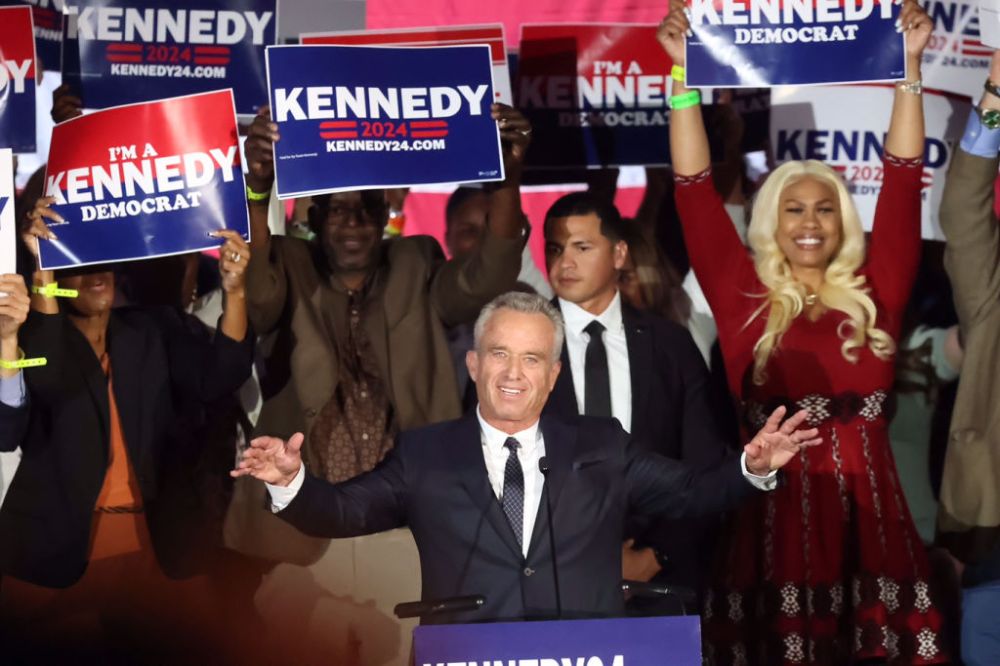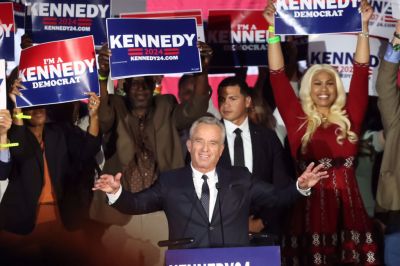Yesterday a mischievous colleague rolled a grenade into the Dispatch Slack channel. “RFK Jr. vs. Trump general election. Who is the worse choice?” he asked.
The blast wave from the detonation sent the entire staff reeling.
Such choices normally wouldn’t be cause for debate. Given the prospect of a second Trump term and all that would entail or four years of Candidate X, you swallow hard and you take your chances with Candidate X. I’ve written numerous times, in fact, about grudgingly reconciling myself to an illiberal rival whose every utterance aims to prove that he’d be a more ruthless authoritarian in office than Trump would. If I can make peace with voting for Ron DeSantis in the name of Moving On, I can make peace with voting for anyone.
Trump or Candidate X? The answer is Candidate X. Every time.
But … maybe not this time. For once, the “Trump or Candidate X?” hypothetical did inspire some internal debate, even among The Dispatch’s Trump-averse personnel.
Having ruminated on it, I think I’d prefer to be governed by Robert Kennedy Jr. than by Trump. While RFK might (and probably would) be willing to attempt a coup to maintain his grip on power, we don’t know that for a fact. The same can’t be said for the alternative.
Kennedy is also unlikely to inspire a personality cult willing to support him in whatever corrupt endeavor he might undertake. If he shot someone on Fifth Avenue or absconded with numerous classified documents or tried to overturn a national election he’d obviously lost, chances are he would lose a few votes. American government can’t work if its leaders can’t be held accountable, and accountability would be easier with RFK.
And the Democratic establishment would do a better job of reining in its own demagogue, I expect, than the Republican establishment has done of reining in Trump. It couldn’t do worse, realistically. But even if, as a matter of basic character, liberal leaders are as cowardly and amoral by instinct as their right-wing counterparts, the fact remains that they’d have more room to maneuver politically against President Kennedy. The left’s coalition is more diverse than the right’s, ideologically and otherwise; absent a cultish dynamic to homogenize opinion, there wouldn’t be as broad of a consensus about defending a presidential kook at all costs as there is among Republicans.
As evidence, look no further than the fact that Democratic voters are more reluctant to renominate a mentally addled but otherwise reasonably successful centrist incumbent than Republicans are to renominate a mentally addled twice-impeached twice-indicted putsch enthusiast.
Which, of course, explains why Robert F. Kennedy Jr. has become A Thing in politics. When a majority of the president’s own party thinks he’s too impaired to serve effectively, there will be some demand for an alternative. Any alternative.
No mystery there. Nor, really, is there a mystery as to why Kennedy is running for president as a Democrat rather than a Republican, a party whose current political culture seems like a much better fit for him.
The mystery is whether he’s a witting part of a plot to tilt the 2024 election to Trump or just a foggy-brained dupe. You know how it is with the Kennedys: There’s always a conspiracy afoot somewhere.
Stop me if this sounds familiar.
A man with a famous last name decides to run for president on a platform of what we might call “contrarian populism.” He’s skeptical of vaccines, soft on Russia, and so reflexively adversarial toward America’s political establishment that he’s willing to believe basically anything that challenges received wisdom. No conspiracy theory is too outlandish to be entertained. As his campaign gains steam, other contrarians with large followings in populist media swarm to him like moths to a flame, either because they share his adversarial agenda or because they’re suckers for any strain of contrarianism so long as it’s offered with enough unapologetic bravado.
What was true of Trump in 2016 is true of RFK Jr. in 2023. (“Skeptical of vaccines” and “soft on Russia” applies at least as much to Ron DeSantis at this point as it does to Trump, in fairness.) Hence the power of the grenade that exploded in yesterday’s Slack channel. What my mischief-making colleague was asking in so many words was whether any “mainstream” political figure might be so far gone intellectually as to make even post-autogolpe Donald Trump seem like a more responsible choice to lead the country by comparison.
I don’t think so, as I’ve said. But a crank for all seasons like RFK should give one pause.
Last month my colleague Kevin Williamson wrote a characteristically brilliant meditation on Kennedy 2024 identifying the candidate’s appeal as fundamentally countercultural. The wrinkle, Kevin noted, is that it’s the modern right more so than the left that’s animated by countering the culture. And not totally without reason.
It is natural—inevitable—that rightists who are opposed to radical social transformation of the sort currently on offer from elite institutions and centers of power should find themselves at odds with those institutions and centers of power. I write rightists rather than conservatives because the people I mean here are not conservative—they have internalized, embraced, or cravenly aped the main elements of the ’60s counterculture, from its ecstatic primal-scream crowd scenes to its murderous nihilism to its political authoritarianism. Steve Bannon was not kidding when he described himself as a “Leninist.”
That the Republican Party might be the seat of burn-it-all-down anti-establishmentarianism would have seemed fantastical to RFK Sr. But it’s so plainly true in 2023, when white-collar types reliably vote Democratic and the left spoils for confrontation with the Russkies, that RFK Jr.’s insurgent candidacy seems deeply confused. How is a man who thinks hydroxychloroquine is effective against COVID and that Russia acted in “good faith” to try to avoid war in Ukraine not a Trumpist Republican?
Consider the possibility that he is. Or, if not a Trumpist Republican, at least a Trumpist.
Kennedy does hold some beliefs that are clearly left-wing. He’s an environmentalist by trade and favors certain gun-control measures, an understandable preference in light of family history. But he also opposed lockdown orders during the pandemic so ardently that he once compared them unfavorably to restrictions placed on Jews in Nazi Germany. He shares right-wing populist views about vaccines and the Ukraine war, as noted. And he happens to be one of the last few remaining “Democrats” in America with warm feelings toward the Republican Party’s political idol.
The warm feelings are mutual, in fact. Asked recently about Kennedy, Trump called him a “common sense guy”(!) and said, “He’s been very nice to me, I’ve actually had a very nice relationship with him over the years. He’s a very smart guy, and a good guy.” When Kennedy was asked in turn what he thought of Trump, he said he was “proud” that Trump likes him despite their disagreement—alleged disagreement—on most issues.
In some ways he’s more Trump than Trump is. Like Trump, he’s a dynast whose surname paved his way to wealth and fame. Like Trump, he seems inclined to believe anything so long as it flatters his prejudices. Like Trump, he gets away with being more heterodox on policy than most of his admirers by turning up the dial on populism to 11. But unlike Trump, the 69-year-old Kennedy has honed an improbably impressive physique that’s left the very manly populist right swooning. If you’re the sort of nationalist who’s weirdly obsessed with masculine strength in all its forms (and they’re all that sort, pretty much), RFK can deliver a version of it that even Trump can’t.
It’s reassuring to know, I suppose, that there are some pharmaceutical substances even Robert F. Kennedy Jr. believes are safe to take.
We still haven’t solved our mystery, though. Why is this exceedingly Trumpist clown running as a Democrat instead of a Republican?
The answer, I think, is that he can do more good for Trump and the right by competing in the other’s party primary than in their own.
The effect of Kennedy running in the Republican primary would be difficult to predict. It’s conceivable that he’d siphon off some of the hardcore crank vote in Trump’s column. That would be bad for the frontrunner.
But I wouldn’t be surprised if he pulled enough of the “chud” vote from Trump and DeSantis to vault him into third place—or second, depending on how much of it he took. Kennedy is a truer populist than DeSantis is, far more authentically suspicious of institutions across the cultural spectrum. He’s managed to poll at 15 percent or so among a primary electorate that’s generally hostile to him while DeSantis is stuck at 21 percent among an electorate that likes him just fine.
If RFK had switched to the Republican Party and brought a bit of Kennedy glamour, name recognition, and off-the-wall conspiratorial thinking to the race, I’m not confident DeSantis would be ahead of him at this point. And if in fact the ultra-hyped governor of Florida slipped behind a guy who thinks AIDS is caused by “poppers,” it would have been the end of DeSantis’ candidacy, I think. The sheer indignity of it would have destroyed him and cinched the nomination for Trump.
But RFK ran as a Democrat. And that also makes sense in some ways.
A man named “Robert F. Kennedy Jr.” could enter a Democratic race confident that he’d enjoy a meaningful base of support even (or especially) among people who’d never heard him speak a word. If you remember RFK 1.0 fondly, if you don’t remember but have been seduced by decades of hagiography, or if you’re just one of the many liberals who thinks Grandpa Joe is past his expiration date, RFK 2.0 seems at first blush like a decent place to park a protest vote.
In time, as those voters got a snootful of what Kennedy actually believes, some were destined to defect. That’s already started, in fact, as he’s dipped from 19-20 percent in early polling against Biden published this spring to the mid-teens lately. But every political coalition has its share of kooks and some of the left’s kooks are assuredly chafing at the prospect of renominating a neoliberal dinosaur like Biden without putting up a fight. DSAers, New Age anti-vaxxers, tankies, diehard greens—they’re all ripe for a long ride on the Kennedy bus.
His mission in this election, I suspect, is to persuade some meaningful share of the discontented kookish left to support Trump in the general election. The question is whether he’s aware of that mission or is merely being used as a pawn by MAGA elements who are egging him on in hopes of executing the strategy I’ve described.
Call it the new Kennedy conspiracy. Is he a knowing stalking horse in a plot to get a right-wing authoritarian reelected in 2024 or is he, to borrow a word made famous by family lore, a “patsy”?
Last week Jonathan Last pointed out that RFK doesn’t seem to be chasing any of the goals typical of presidential primary challengers. He has no prospect of defeating Biden or of moving the president toward his fringy positions on matters like vaccines or funding Ukraine. And he’s not really voicing the dissatisfaction of the Democratic base. The voters he’s courting are people who are so outré in their political beliefs that they wouldn’t have voted for Biden next fall in any case.
The question, Last believes, is whether some of those people can be converted into Trump voters through RFK’s influence. “He’s a Fifth Column inside the Democratic coalition,” he writes of the candidate. Is that true?
Well, there is this tidbit from April.
Kennedy has appeared on Bannon’s podcast numerous times since the start of the pandemic to rally opponents of lockdowns. He made enough of an impression on the host that Bannon touted him in April of this year as a dark-horse candidate for vice president—Trump’s vice president. “Somebody asked about Robert F. Kennedy, and the great speech at Hillsdale, and his opening speech, and what did I think about his prospects,” Bannon said at the time. “I said, ‘Look, I’m a Kari Lake person, but if Kari Lake becomes governor, as she should, with this court case, or if not, if she runs for the Senate—if she’s not available to be Trump’s VP, that Bobby Kennedy would be, I think, would be an excellent choice for President Trump to consider.’ It was a standing ovation.”
If you’re wondering what Kennedy was doing speaking at a conservative bastion like Hillsdale College, you clearly don’t consume much right-wing media. He’s been chummy with MAGA populists since at least mid-2021, when he turned up at a “Reawaken America” event and posed for photos with Mike Flynn and Roger Stone. He has an admirer not just in Bannon but in Tucker Carlson and Rudy Giuliani, among others. He’s been an esteemed guest lately on Sean Hannity’s and Laura Ingraham’s primetime shows on Fox News and redpilled icons like Joe Rogan and Elon Musk find him very much worth listening to. He was even scheduled to speak this week at the Moms for Liberty summit in Philadelphia, a cattle call for Republican candidates (Trump and DeSantis included), but canceled belatedly due to a “scheduling” issue.
Recently The Atlantic caught up with Kennedy and asked him if it’s true that Bannon encouraged him to challenge Biden. No, the candidate said. Bannon himself was cagier.
When I asked Bannon if he had urged Kennedy to challenge Biden, he said, “I don’t want to talk about personal conversations.” He told me he believes Kennedy could be a major political figure. “I was pleasantly surprised when he announced,” he said.
“He’s drawing from many of those Trump voters—the two-time Obama, onetime Trump—that are still disaffected, want change, and maybe haven’t found a permanent home in the Trump movement,” Bannon said. “Populist left, populist right—and where that Venn diagram overlaps—he’s talking to those people.” Bannon told me the audience for his podcast, War Room, “loves” Kennedy. “I think Tucker’s seeing it, Rogan’s seeing it, other people—the Tucker-Rogan-Elon-Bannon-combo-platter right, obviously some of us are farther right than others—I think are seeing it. It’s a new nomenclature in politics,” he said.
“The Tucker-Rogan-Elon-Bannon-combo-platter right” is as cursed a construct as I can imagine. But Bannon’s not wrong in locating Kennedy’s appeal on the right: In recent polling, RFK has fallen to a net favorability of seven points among Democrats … and risen to net 29 points favorable among Republicans.
Last thinks he knows where this ends. Next summer, he predicts, Robert F. Kennedy Jr. will stride to the podium at the Republican National Convention and receive a hero’s welcome as he prepares to endorse Donald J. Trump for president. That seems eminently plausible to me; Kennedy isn’t prone to turning down publicity opportunities, let alone ones with a national audience. And he won’t need to worry about being disinvited from the Democratic convention if he throws in with the GOP, needless to say.
Whether the kook left might be swayed by his endorsement to turn out for the architect of January 6 seems less plausible, but RFK is all but destined to ask them to. All I want to know is whether that’s been the plan all along or if, irony of ironies, this conspiracy connoisseur truly is oblivious to the fact that he’s the subject of a coordinated MAGA effort to use him to get Trump reelected. Co-conspirator or patsy? As usual with the Kennedys, the full truth might never be known.







Please note that we at The Dispatch hold ourselves, our work, and our commenters to a higher standard than other places on the internet. We welcome comments that foster genuine debate or discussion—including comments critical of us or our work—but responses that include ad hominem attacks on fellow Dispatch members or are intended to stoke fear and anger may be moderated.
With your membership, you only have the ability to comment on The Morning Dispatch articles. Consider upgrading to join the conversation everywhere.